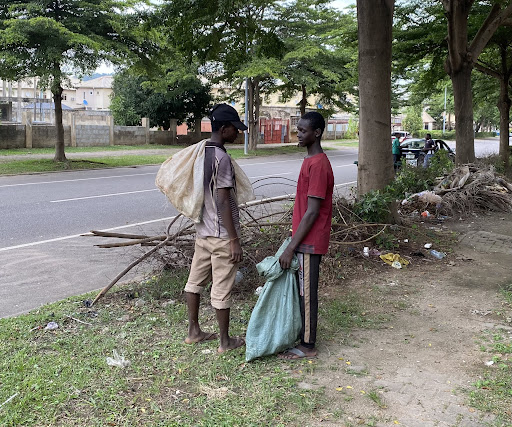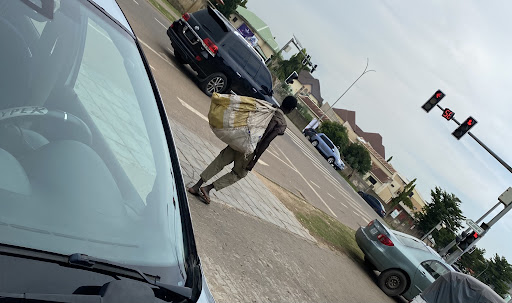Scavenging Reignites Hope Of Schooling For Young Boys In Abuja Despite Ban
Youths from neighbouring states travel down to Nigeria’s capital city to make a living and secure a future for themselves from picking recyclable waste in spite of a ban by the local authorities.

Nura Kabir carries a gunny sack and moves across affluent neighbourhoods in Nigeria’s capital city Abuja, scouting waste bins for recyclable or valuable items he can sell to earn a living.
The 22-year-old secondary school graduate from Katsina, Northwest Nigeria, survives by picking up plastic bottles, metals, books, and other things in exchange for cash.
Kabir told HumAngle he came to Abuja five months ago, with the intention to start the scavenging business. He believes he would make enough to take care of his needs and even save for his education.
“In a day, I can make N2,000 to N3,000 depending on the quantity of items I pick,” he said.
Kabir, who is the first of nine children, adds that he takes care of himself, sends some money to his parents, and saves from his earnings.
His parents live in Ingawa Local Government Area (LGA) of Katsina state. His father, Mallam Kabir, is a trader, who sells tea and bread.
“The money my father makes out of his business is not enough to fend for all of us, I just have to work hard so I can take care of my siblings too,” Kabir lamented.
“I would love to further my education in the next two to three years to come. That’s my main reason for saving,” he said as his face blushed with excitement.
In 2018, the Federal Capital Territory Administration (FCTA) banned the activities of scavengers from Abuja’s city centre.
The Secretary, FCTA Social Development Secretariat, Ladi Hassan, said the action was necessitated by outcries from residents to the effect that many valuables have been lost to scavengers in the territory.
Despite the ban, scavengers are still seen roaming around in search of items so they could earn a living.
Just like Kabir, Marwana Saeed, a 20-year-old final-year secondary school student, also came from Katsina to Abuja to earn from scavenging so he could save and pay for his external examination.
“I came to Abuja to start scavenging because I heard it is lucrative. In a day I make N1,000 to N2,000 based on the monetary value of what I pick,” Saeed said. “I’m saving the money I’m getting so I could pay my tuition fee when we resume school.”
Meanwhile, the Abuja Environmental Protection Board (AEPB) recently confirmed the ban on scavenging, stating that it considered it illegal.
AEPB Public Relations Officer (PRO) Janet Peni said the agency had an enforcement team that arrests and evacuates the defaulters from the area.
No knowledge of the ban!
While ignorance of the law is not a defence, the young boys claimed they did not know about the ban on scavenging in FCT.
Kabir made a funny look when asked if he knew he wasn’t allowed by law to go about the city or Abuja picking waste or plastics. “Why would there be a ban on people who want to make money decently and clean up the city from being polluted with excess plastic waste? We do not steal, we pick things from waste bins and on littered street roads,” he argued.
Like Kabir, Ibrahim Badamasi, 18, is startled to hear about a ban. “I don’t know about the ban, I’ve never heard of it,” he said.
Badamasi is a school dropout from Kano State. He came to Abuja to stay with his brother, who is also a scavenger, after trying so hard, but unsuccessfully, to get a job.

“At first I didn’t want to start this, I don’t like the nature of the business, but I have to eat and do other things for myself,” he said.
“I once fell ill in the course of scavenging; I was picking up items and I mistakenly slit my hand with the trash can. I couldn’t do anything for a whole week. I had to get injections and drugs with the little I had.”
According to a research article, scavenging reduces waste reaching landfills while also providing jobs for the poor.
It, however, constitutes a serious health hazard. The United Nations Environmental Programme (UNEP) established that scavengers may suffer from respiratory disorders due to protracted exposure to smoke from fires and dust from the waste dumpsite. Also, they may be injured by sharp objects resulting in death or get exposed to Human Immunodeficiency Virus (HIV) and even hepatitis infection from healthcare waste.
Additional reporting by Daniel Bernerd
Support Our Journalism
There are millions of ordinary people affected by conflict in Africa whose stories are missing in the mainstream media. HumAngle is determined to tell those challenging and under-reported stories, hoping that the people impacted by these conflicts will find the safety and security they deserve.
To ensure that we continue to provide public service coverage, we have a small favour to ask you. We want you to be part of our journalistic endeavour by contributing a token to us.
Your donation will further promote a robust, free, and independent media.
Donate HereStay Closer To The Stories That Matter




